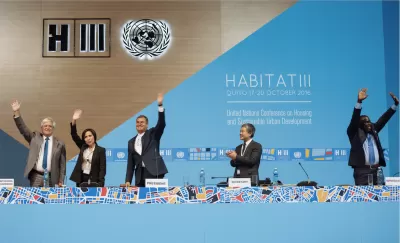The United Nation’s New Urban Agenda has created a playbook for planning advocates. It opens possibilities for building inclusive, integrated urban planning in countries where planning has been top-down and limited in scope.

The U.N.'s New Urban Agenda is positioned as a playbook for implementation of Sustainable Development Goal 11: Sustainable Cities and Communities. It has the potential to elevate the profile of urban planning in many countries and to spread the so-called reinvention of urban planning as inclusive, bottom-up, and integrative. Yet the New Urban Agenda has clear roots in a government-centered, modernist practice of planning that has been discredited by planning theorists in recent decades, and any global template for planning runs the risk of tone-deafness to the unique characteristics of individual countries.
"Planners and the New Urban Agenda: Will we lead the agenda, or will the agenda lead us?" an article just published (open access for a short time) in Town Planning Review, examines the origins and development of the New Urban Agenda, examines its planning components, assesses its challenges, and recommends strategies for maximizing outcomes that emphasize broad stakeholder engagement, cross-sectoral planning integration, and national and sub-national choice in the design of planning processes and solutions. Critically, the article considers the demands of corporate power, the new regionalism, and growing theorizing in the Global South, as contests to dominant planning paradigms of the 20th century that demand responses if planning is to fulfill the needs of today's cities and regions.
I urge planning agencies, firms, associations, and individual planners to seize the momentum created by the New Urban Agenda to take bold steps to promote new planning programs and to reinvigorate and redirect existing programs. We need a substantial increase in global planning capacity, broadening of the engagement of the full range of stakeholders in planning processes, recognition that planned action involves far more than plan making, and most importantly, commitment that planning must be locally or nationally determined while informed by international experience.
This is a pivotal moment in global urban development. Rapid urbanization, climate change, and economic restructuring are pressuring environmental, social, and fiscal resources near breaking points. International sharing of planning ideas, tools and methods is critical to success, but to work well must be done with respect for political, economic and cultural contexts. The New Urban Agenda, endorsed without dissent by the United Nations member states, provides a powerful framework for the needed context-sensitive, professionally-informed policy making and design.
"Planners and the New Urban Agenda: will we lead the agenda, or will the agenda lead us?" Town Planning Review 92 (4): 421-441, is available in open access for a short promotional period from Liverpool University Press.

Planetizen Federal Action Tracker
A weekly monitor of how Trump’s orders and actions are impacting planners and planning in America.

The Simple Legislative Tool Transforming Vacant Downtowns
In California, Michigan and Georgia, an easy win is bringing dollars — and delight — back to city centers.

San Francisco's School District Spent $105M To Build Affordable Housing for Teachers — And That's Just the Beginning
SFUSD joins a growing list of school districts using their land holdings to address housing affordability challenges faced by their own employees.

In More Metros Than You’d Think, Suburbs are Now More Expensive Than the City
If you're moving to the burbs to save on square footage, data shows you should think again.

The States Losing Rural Delivery Rooms at an Alarming Pace
In some states, as few as 9% of rural hospitals still deliver babies. As a result, rising pre-term births, no adequate pre-term care and "harrowing" close calls are a growing reality.

The Small South Asian Republic Going all in on EVs
Thanks to one simple policy change less than five years ago, 65% of new cars in this Himalayan country are now electric.
Urban Design for Planners 1: Software Tools
This six-course series explores essential urban design concepts using open source software and equips planners with the tools they need to participate fully in the urban design process.
Planning for Universal Design
Learn the tools for implementing Universal Design in planning regulations.
Smith Gee Studio
City of Charlotte
City of Camden Redevelopment Agency
City of Astoria
Transportation Research & Education Center (TREC) at Portland State University
US High Speed Rail Association
City of Camden Redevelopment Agency
Municipality of Princeton (NJ)






























